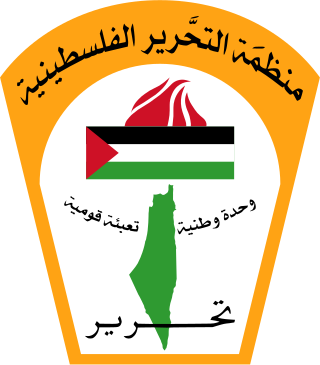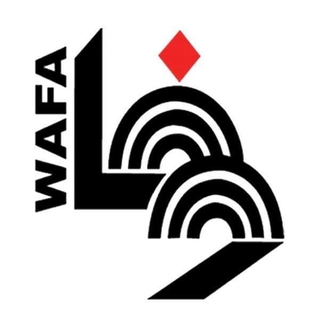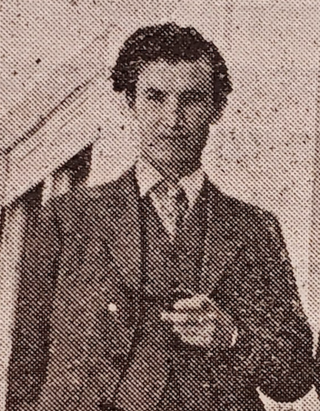Related Research Articles

The Palestine Liberation Organization is a Palestinian nationalist coalition that is internationally recognized as the official representative of the Palestinian people; i.e. the globally dispersed population, not just those in the Palestinian territories who are represented by the Palestinian Authority. Founded in 1964, it initially sought to establish an Arab state over the entire territory of the former Mandatory Palestine, advocating the elimination of the State of Israel. However, in 1993, the PLO recognized Israeli sovereignty with the Oslo I Accord, and now only seeks Arab statehood in the Palestinian territories that have been militarily occupied by Israel since the 1967 Arab–Israeli War.
The Arab League was formed in Cairo on 22 March 1945 with six members: Egypt, Iraq, Transjordan, Lebanon, Saudi Arabia, and Syria. Yemen joined on 5 May 1945. Since its formation the Arab League has promoted the Palestinian Arab cause in the Israeli–Palestinian conflict, including by imposing the Arab League boycott of Israel. The Arab League opposed the United Nations Partition Plan for Palestine in 1947. On 15 May 1948, the then seven Arab League members coordinated an invasion of what was by then the former British Mandate, marking the start of the 1948 Arab–Israeli War.
Samir Kassir was a Lebanese-Palestinian journalist of An-Nahar and professor of history at Saint-Joseph University, who was an advocate of democracy and prominent opponent of the Syrian occupation of Lebanon. He was assassinated in 2005 as part of a series of assassinations of anti-Syria Lebanese political figures such as Rafic Hariri and George Hawi.
Diana Buttu is a Palestinian-Canadian lawyer and a former spokesperson for the Palestine Liberation Organization. Best known for her work as a legal adviser and a participant in peace negotiations between Israeli and Palestinian organizations, she has since been associated with Stanford University, Harvard University, and the Institute for Middle East Understanding (IMEU).

Wafa, also referred to in English as the Palestine News Agency and the Palestinian News & Info Agency, is the official state-run news agency of the Palestinian National Authority (PNA). Before the formation of the PNA in 1994, Wafa was the official news agency of the Palestine Liberation Organization.

The Institute for Palestine Studies (IPS) is the oldest independent nonprofit public service research institute in the Arab world. It was established and incorporated in Beirut, Lebanon, in 1963 and has since served as a model for other such institutes in the region. It is the only institute in the world solely concerned with analyzing and documenting Palestinian affairs and the Arab–Israeli conflict. It also publishes scholarly journals and has published over 600 books, monographs, and documentary collections in English, Arabic and French—as well as its renowned quarterly academic journals: Journal of Palestine Studies, Jerusalem Quarterly, and Majallat al-Dirasat al-Filistiniyyah. IPS's Library in Beirut is the largest in the Arab world specializing in Palestinian affairs, the Arab–Israeli conflict, and Judaica.

Rashid Ismail Khalidi is a Palestinian-American historian of the Middle East and the Edward Said Professor of Modern Arab Studies at Columbia University. He served as editor of the Journal of Palestine Studies from 2002 until 2020, when he became co-editor with Sherene Seikaly.
Ibrahim Abu-Lughod was a Palestinian academic, characterised by Edward Said as "Palestine's foremost academic and intellectual" and by Rashid Khalidi as one of the first Arab-American scholars to have a really serious effect on the way the Middle East is portrayed in political science and in America". His student Deborah J. Gerner wrote that he "took on the challenge of interpreting U.S. politics and society for the Palestinian community as well as eloquently articulating Palestinian aspirations to the rest of the world."
Institute for Middle East Understanding (IMEU) is a 501(c)(3) Pro-Palestinian non-profit advocacy organization.

Walid Khalidi is a Palestinian historian who has written extensively on the Palestinian exodus. He is a co-founder of the Institute for Palestine Studies, established in Beirut in December 1963 as an independent research and publishing center focusing on the Palestine problem and the Arab–Israeli conflict, and was its general secretary until 2016.

Rami George Khouri is a Jordanian-American journalist and editor with Palestinian background. He was born in New York City to an Arab Palestinian Christian family. His father, George Khouri, a Nazarene journalist in what was the British mandate of Palestine, had traveled with his wife to New York in 1947 to cover the United Nations (UN) debates about the future of Palestine. His family resides in Beirut, Amman, and Nazareth. He is also a public speaker. After attending secondary school at the International School of Geneva in Switzerland, Rami Khouri returned to the US to complete his education. Khouri has served for many years as the chief umpire for Little League Baseball in Jordan.
Hisham Sharabi was Professor Emeritus of History and Umar al-Mukhtar Chair of Arab Culture at Georgetown University, where he was a specialist in European intellectual history and social thought. He died of cancer at the American University of Beirut hospital on January 13, 2005.
Tarif Khalidi is a Palestinian historian who now holds the Shaykh Zayid Chair in Islamic and Arabic Studies at the American University of Beirut in Lebanon.
Rosemary Sayigh is a British-born journalist and scholar of Middle Eastern history. She is known for her works on the Palestinian people, particularly those forcibly displaced to Lebanon as a result of the Nakba.
Islamic graffiti is a genre of graffiti created by people who usually relate to the Middle East or North Africa, using Arabic or other languages for social or political messages. It is a popular art genre created by "artists, graffiti writers, designers and typographers from the Middle East and around the world who merge Arabic calligraphy with the art of graffiti writing, street art and urban culture."
Janet Lee Stevens was an American journalist, human rights advocate, translator, and scholar of popular Arabic theater. She lived in Beirut during the Lebanese Civil War and chronicled the experiences of Palestinian refugees before and after the Sabra and Shatila Massacre of September 16–18, 1982.
Refqa Abu-Remaileh is a university teacher and author with a focus on Modern Arabic literature and film studies. Since 2020, she is associate professor in the department for Semitic and Arabic Studies at the Free University of Berlin, Germany. She is mainly known for her publications on the literature and films created by Palestinian people who often live as refugees and exiles, both in the Middle East and the world-wide Palestinian diaspora.
Camille Mansour is a Palestinian academic. In addition to his teaching post at different universities he has worked at the Institute for Palestine Studies (IPS), Beirut, Lebanon, in various capacities, including the secretary-general of its board of trustees.
References
- ↑ Barghouti, Omar (2011). BDS: Boycott, Divestment, Sanctions : the Global Struggle for Palestinian Rights. Haymarket Books. p. 276. ISBN 978-1608461141.
- ↑ Hijab, Nadia (1988). Womanpower: The Arab Debate on Women at Work . Cambridge University Press. p. 9. ISBN 978-0521269926.
- ↑ Sharabi, Hisham (1988). The Next Arab decade: alternative futures. Westview Press. p. 330. ISBN 9780720119572.
- ↑ Ansari, Shahid Jamal (1998). Political Modernization in the Gulf. Northern Book Centre. p. 81. ISBN 978-8172110888.
- 1 2 "Nadia Hijab: Analyst and author". Institute for Middle East Understanding. December 31, 2006. Archived from the original on November 3, 2014. Retrieved November 3, 2014.
- ↑ "Nadia Hijab". Al-Shabaka. Retrieved June 3, 2024.
- ↑ Hijab, Nadia (October 17, 2014). "Recognition's Diplomatic Leverage Could Strengthen Palestinian Right". The New York Times. Retrieved November 3, 2014.
- ↑ "Uprisings in the Middle East: A New Arab World Order". The Jerusalem Fund. Archived from the original on November 3, 2014. Retrieved November 3, 2014.
- ↑ "About Al-Shabaka". Al-Shabaka. Retrieved June 3, 2024.
- ↑ "Nadia Hijab". Institute for Palestine Studies. Archived from the original on July 31, 2021. Retrieved July 12, 2022.